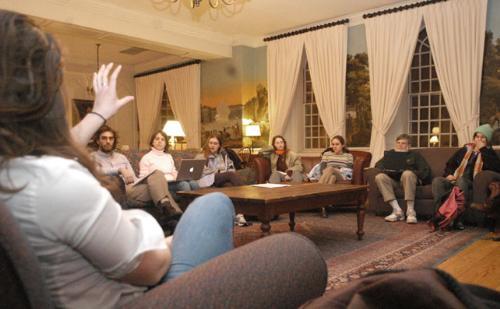
News
HMS Is Facing a Deficit. Under Trump, Some Fear It May Get Worse.

News
Cambridge Police Respond to Three Armed Robberies Over Holiday Weekend

News
What’s Next for Harvard’s Legacy of Slavery Initiative?

News
MassDOT Adds Unpopular Train Layover to Allston I-90 Project in Sudden Reversal

News
Denied Winter Campus Housing, International Students Scramble to Find Alternative Options
WISHR Proposes Resources For Women

In an effort to address concerns sparked by the recent controversial comments of University President Lawrence H. Summers, Women In Science at Harvard-Radcliffe (WISHR) is working with undergraduates to lobby ideas for increasing academic and financial resources available to Harvard’s women in science.
Already, four representatives of WISHR have met with Summers and Dean of the College Benedict H. Gross ’71 to mount suggestions focusing on the undergraduate experience of female science concentrators.
To encourage input, WISHR has been holding brainstorming sessions, or “Think Tanks,” open to students all over campus.
These sessions—two of which have been held already—are part of the undergraduate working group of the Women in Science and Engineering task force, which is chaired by Higgins Professor of Natural Sciences Barbara J. Grosz. The group is charged with devising proposals to confront challenges facing women in science at Harvard.
“By looking at other places across the country and formulating ideas through brainstorming in the think tanks, we hope to come up with ideas that would make difference at Harvard and also provide a model for other universities,” Grosz said.
The ideas discussed at the Think Tanks will be used to formulate proposals that will be presented to the task force this spring by WISHR President Mariangela Lisanti ’05 and Mallinckrodt Professor of Physics Howard Georgi, who are co-chairing the working group.
These suggestions will be passed on to University administrators through the task force later this academic year.
Lisanti said that the proposals presented at their most recent meeting aimed to help freshmen, guide those still debating their course of study, and assist others curious about the pre-med track.
One plan includes enhancing introductory courses in the sciences by providing better training for teaching fellows, increasing social networking, and providing more female role models in terms of tenured professors and advisers.
“I think that one thing that we’ve really been emphasizing is the need for role models, people that you can say, I want to be them in 10 years or 30 years,” said Elina Onitskansky, business manager for WISHR’s annual symposium.
The WISHR representatives also proposed holding freshman orientation programs that would provide course-wide consultations and lab tours to encourage interest and reduce the number of dropouts in science fields.
“It’s important to keep in mind our suggestions aren’t just women-centric. We want to create a situation where incoming students and freshmen get exposure to professors and upperclassmen who can advise them,” Onitskanksy said.
While question-and-answer sessions are held nightly for math classes, no such centers for chemistry or biology exist, Lisanti said. She suggested that implementing these sessions for science courses would be a quick way to provide immediate assistance to students in need.
Another significant aspect of WISHR’s proposals to administrators is an emphasis on establishing centralized programs on campus to help women find work in labs and gain experience through research programs. These programs would also provide funding for summer housing as well as coordinate advising.
Lisanti said these suggestions were met with open ears during the meeting with Summers and Gross.
“It was a very productive discussion,” Lisanti said. “They indicated that they understood our concerns and that it was very important that we all work together so that new programs could be instituted soon.”
Think Tank brainstorm sessions will continue with the next meeting slotted for Saturday. Yesterday’s meeting, held in Lowell JCR, was closed to reporters in an effort to allow participants to share their thoughts without worry, Lisanti said.
In addition to working with the task force, WISHR is also holding the third annual National Symposium on the Advancement on Women in Science.
The conference is of particular relevance this year in light of recent criticisms of the plight of women in science at Harvard.
The four day conference seeks to showcase undergraduate research and bring in experts dealing with representation of women in the sciences, said Onitskansky.
The April symposium, like WISHR’s work in the Think Tanks, aims to provide women with the chance to capitalize on their interest in the sciences, according to Lisanti.
“A strong faculty and peer support system is a critical component of the undergraduate experience,” Lisanti said. “WISHR wants to ensure that such support is available to undergraduate women in science. Our proposals on research, advising, and teaching are designed to make sure that this is the case.”
—Staff writer Ying Wang can be reached at yingwang@fas.harvard.edu.
Want to keep up with breaking news? Subscribe to our email newsletter.
